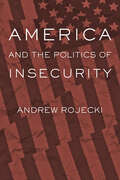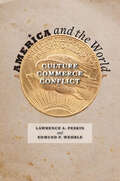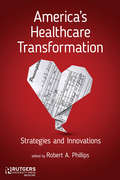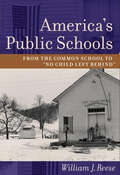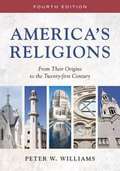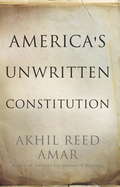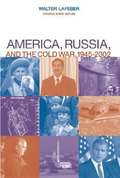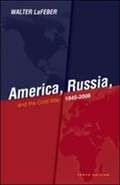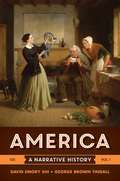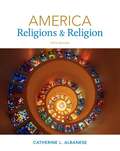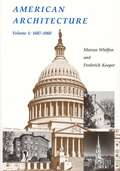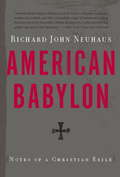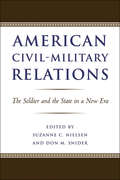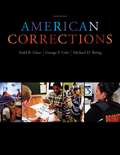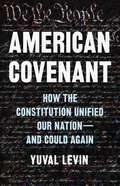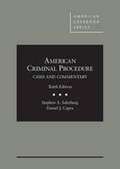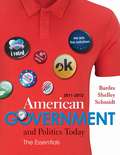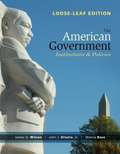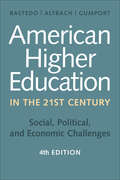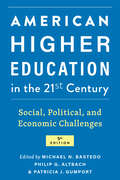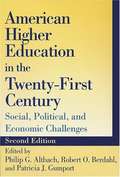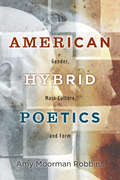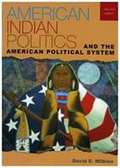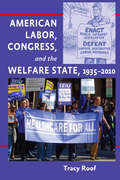- Table View
- List View
America and the Politics of Insecurity (Themes in Global Social Change)
by Andrew RojeckiAn innovative analysis of polarized politics post-9/11.In America and the Politics of Insecurity, Andrew Rojecki assesses the response of citizens and politicians to a series of crises that confronted the United States during the first decade of the twenty-first century. This period brought Americans face to face with extraordinarily difficult problems that were compounded by their origin in seemingly uncontrollable global forces. Rojecki establishes a theoretical framework for understanding how these new uncertainties contribute to increasingly polarized political discourse. Analyzing three domains of American insecurity—economic, environmental, and existential—Rojecki examines responses to the Great Recession by groups like the Tea Party and Occupy Wall Street; considers why the growing demand for fossil fuels makes people disregard global warming; and explores the desire for security measures that restrict personal freedom in the age of terrorism. Ultimately, he explains why the right has thus far held an edge over the left in the politics of insecurity.Rojecki concludes that in order to address these broad-scale political problems, we must reframe domestic issues as reactions to undiagnosed global conditions. Bringing the psychology of uncertainty together with contemporary case studies, this book is a sweeping diagnostic for—and antidote to—ineffective political discourse in a globalized world that imports bads as well as goods.
America and the World: Culture, Commerce, Conflict
by Edmund F. Wehrle Lawrence A. PeskinAlthough the twenty-first century may well be the age of globalization, this book demonstrates that America has actually been at the cutting edge of globalization since Columbus landed here five centuries ago.Lawrence A. Peskin and Edmund F. Wehrle explore America's evolving connections with Europe, Africa, and Asia in the three areas that historically have been indicators of global interaction: trade and industry, diplomacy and war, and the "soft" power of ideas and culture. Framed in four chronological eras that mark phases in the long history of globalization, this book considers the impact of international events and trends on the American story as well as the influence America has exerted on world developments. Peskin and Wehrle discuss how the nature of this influence—whether economic, cultural, or military—fluctuated in each period. They demonstrate how technology and disease enabled Europeans to subjugate the New World, how colonial American products transformed Europe and Africa, and how post-revolutionary American ideas helped foment revolutions in Europe and elsewhere. Next, the authors explore the American rise to global economic and military superpower—and how the accumulated might of the United States alienated many people around the world and bred dissent at home. During the civil rights movement, America borrowed much from the world as it sought to address the crippling "social questions" of the day at the same time that Americans—especially African Americans—offered a global model for change as the country strove to address social, racial, and gender inequality. Lively and accessible, America and the World draws on the most recent scholarship to provide a historical introduction to one of today's vital and misunderstood issues.
America's Healthcare Transformation: Strategies and Innovations
by Thomas H. Lee Sandra A. Weiss Nikhil G. Thaker Arthur Tim" Garson David W. Bates Hanh H. Hoang Philip Greenland Tine Hansen-Turton Sarah Slight James L. Field Susan A. Abookire Thomas W. Feeley Amir Rubin Janet J. Teske Julia D. Andrieni Alicia D.H. Monroe Kenneth Patric Steven R. Steinhubl Elizabeth Malcolm Nana Ekua Coleman Mark R. Chassin William S. Weintraub Kasey R. Boehmer Arnold Milstein Sharyl Wojciechowski Marc L. Boom Victor M. Montori Henry H. Ting Ju Young Kim Erin S. Dupree Gary S. Kaplan Mauro Ferrari Jason Gorevic Kasaiah Makam Kunal N. Karmali Alberta T. Pedroja Dr Robert A. Phillips Deirde MylodA revolution in American medicine is in full swing, with the race from fee-for-service to fee-for-value at the front line in an epic battle that will transform healthcare delivery for decades to come. In America's Healthcare Transformation, eminent physician leader Robert A. Phillips brings together key thought leaders and trail-blazing practitioners, who provide a wide-ranging exploration of the strategies, innovations, and paradigm shifts that are driving this healthcare transformation. The contributors offer a panoramic look at the dramatic changes happening in the field of medicine, changes that put the patient at the heart of the process. Among other subjects, the essays evaluate innovative high quality and low cost care delivery solutions from around the United States and abroad, describe fundamental approaches to measuring the safety of care and the impact that guidelines have on improving quality of care and outcomes, and make a strong case that insurance reform will fundamentally and irreversibly drive delivery reform. In addition, America's Healthcare Transformation reviews the role of health information technology in creating safer healthcare, provides a primer on the development of a culture of safety, and highlights ground-breaking new ways to train providers in patient safety and quality. Finally, the book looks at reports from Stanford Health Care and Houston Methodist which outline how successful behaviorally based strategies, anchored in values, can energize and empower employees to deliver a superior patient experience. Drawing on the wisdom and vision of today's leading healthcare innovators, America's Healthcare Transformation provides a roadmap to the future of American healthcare. This book is essential reading for all health care providers, health care administrators, and health policy professionals, and it will be an invaluable resource in the effort to improve the practice of medicine and the delivery of healthcare in our communities and nation.
America's Public Schools: From the Common School to "No Child Left Behind" (The American Moment)
by William J. ReeseIn this update to his landmark publication, William J. Reese offers a comprehensive examination of the trends, theories, and practices that have shaped America’s public schools over the last two centuries. Reese approaches this subject along two main lines of inquiry—education as a means for reforming society and ongoing reform within the schools themselves. He explores the roots of contemporary educational policies and places modern battles over curriculum, pedagogy, race relations, and academic standards in historical perspective.A thoroughly revised epilogue outlines the significant challenges to public school education within the last five years. Reese analyzes the shortcomings of "No Child Left Behind" and the continued disjuncture between actual school performance and the expectations of government officials. He discusses the intrusive role of corporations, economic models for enticing better teacher performance, the continued impact of conservatism, and the growth of home schooling and charter schools. Informed by a breadth of historical scholarship and based squarely on primary sources, this volume remains the standard text for future teachers and scholars of education.
America's Religions: From Their Origins to the Twenty-first Century (3rd edition)
by Peter W. WilliamsIn this comprehensive survey, Williams offers concise descriptions of the background, beliefs, practices, and leaders of America's most influential and distinctive religious movements and denominations. Thoroughly revised and updated, this third edition of America's Religions incorporates the latest scholarship on religion and considers timely issues such as status of Muslims in the United States after September 11, 2001; the impact of religion on American politics, especially concerning the emergence of the Religious Right; and the intense battles fought within the Catholic Church and other denominations over the status of gay marriage and accusations of clergy members' sexual abuse. This edition also includes thirty-eight new illustrations of key persons in American religious history and notable places of worship.
America's Unwritten Constitution: The Precedents and Principles We Live By
by Akhil Reed AmarDespite its venerated place atop American law and politics, our written Constitution does not enumerate all of the rules and rights, principles and procedures that actually govern modern America. The document makes no explicit mention of cherished concepts like the separation of powers and the rule of law. On some issues, the plain meaning of the text misleads. For example, the text seems to say that the vice president presides over his own impeachment trial-but surely this cannot beright. As esteemed legal scholar Akhil Reed Amar explains inAmerica’s Unwritten Constitution, the solution to many constitutional puzzles lies not solely within the written document, but beyond it-in the vast trove of values, precedents, and practices that complement and complete the terse text. In this sequel toAmerica’s Constitution: A Biography, Amar takes readers on a tour of our nation’sunwrittenConstitution, showing how America’s foundational document cannot be understood in textual isolation. Proper constitutional interpretation depends on a variety of factors, such as the precedents set by early presidents and Congresses; common practices of modern American citizens; venerable judicial decisions; and particularly privileged sources of inspiration and guidance, including theFederalistpapers, William Blackstone’sCommentaries on the Laws of England, the Northwest Ordinance of 1787, Lincoln’s Gettysburg Address, and Martin Luther King, Jr. ’s "I Have a Dream” speech. These diverse supplements are indispensible instruments for making sense of the written Constitution. When used correctly, these extra-textual aids support and enrich the written document without supplanting it. An authoritative work by one of America’s preeminent legal scholars,America’s Unwritten Constitutionpresents a bold new vision of the American constitutional system, showing how the complementary relationship between the Constitution’s written and unwritten components is one of America’s greatest and most enduring strengths.
America, Russia, and the Cold War 1945-2002 (Updated Ninth Edition)
by Walter LafeberProfessor LaFeber explains the course of the Cold War as it moved from periods of intense crisis and confrontation to times of relative stability.
America, Russia, and the Cold War, 1945-2006 (Tenth Edition)
by Walter LafeberUsing extensive materials from both published and private sources, this concise text focuses on United States-Soviet diplomacy to explain the causes and consequences of the Cold War. It explores how the Cold War was shaped by domestic events in both the U. S. and the Soviet Union and presents a variety of other points of view on the conflict--Chinese, Latin American, European, and Vietnamese. The text includes both engaging anecdotes and quotes from primary sources to support key points and exemplify policies, and recent scholarship and materials from openings of the U. S. , Soviet, and Chinese archives.
America: A Narrative History, Volume 1
by David Emory Shi George Brown TindallThe leading narrative history that students love to read, now made more relevant and accessible.With more than two million copies sold, America remains the leading narrative history survey text because it's a book that students enjoy reading. The Tenth Edition is both more relevant, offering increased attention to the culture of everyday life, and more accessible, featuring a reduced number of chapters and a streamlined narrative throughout.
America: Religions and Religion (5th Edition)
by Catherine L. AlbaneseAlbanese (emerita, comparative religions, U. of California--Santa Barbara) introduces students to the variety of religions in the US, and to the theories and practices of studying religion. She considerably shortened and revised the 2007 fourth edition to account for changes in classes and students, and for this fifth takes account of changes in the religious landscape since then--including findings from the 2010 census. She covers the original cast, new-made in America, patterns of expansion and contraction, and American religion and American identity. Among specific topics are tradition and change among Native Americans, the presence of Roman Catholicism, the protestant churches and the mission mind, African American religion and nationhood, 19th-century new religions, Eastern peoples and Eastern religions, and many centers meeting.
American Architecture: 1607-1860
by Marcus Whiffen Frederick KoeperThe first volume of a two-volume survey of American Architecture, this book covers architectural developments from Jamestown to the Civil War.
American Babylon: Notes of a Christian Exile
by Richard John NeuhausChristians are by their nature a people out of place. Their true home is with God; in civic life, they are alien citizens "in but not of the world. " InAmerican Babylon, eminent theologian Richard John Neuhaus examines the particular truth of that ambiguity for Catholics in America today. Neuhaus addresses the essential quandaries of Catholic life-assessing how Catholics can keep their heads above water in the sea of immorality that confronts them in the world, how they can be patriotic even though their true country is not in this world, and how they might reconcile their duties as citizens with their commitment to God. Deeply learned, frequently combative, and always eloquent,American Babylonis Neuhaus'smagnum opus-and will be essential reading for all Christians.
American Civil-Military Relations: The Soldier and the State in a New Era
by Suzanne C. Nielsen Don M. SniderAmerican Civil-Military Relations offers the first comprehensive assessment of the subject since the publication of Samuel P. Huntington's field-defining book, The Soldier and the State. Using this seminal work as a point of departure, experts in the fields of political science, history, and sociology ask what has been learned and what more needs to be investigated in the relationship between civilian and military sectors in the 21st century.Leading scholars—such as Richard Betts, Risa Brooks, James Burk, Michael Desch, Peter Feaver, Richard Kohn, Williamson Murray, and David Segal—discuss key issues, including:• changes in officer education since the end of the Cold War;• shifting conceptions of military expertise in response to evolving operational and strategic requirements;• increased military involvement in high-level politics; and• the domestic and international contexts of U.S. civil-military relations.The first section of the book provides contrasting perspectives of American civil-military relations within the last five decades. The next section addresses Huntington's conception of societal and functional imperatives and their influence on the civil-military relationship. Following sections examine relationships between military and civilian leaders and describe the norms and practices that should guide those interactions. The editors frame these original essays with introductory and concluding chapters that synthesize the key arguments of the book. What is clear from the essays in this volume is that the line between civil and military expertise and responsibility is not that sharply drawn, and perhaps given the increasing complexity of international security issues, it should not be. When forming national security policy, the editors conclude, civilian and military leaders need to maintain a respectful and engaged dialogue. American Civil-Military Relations is essential reading for students and scholars interested in civil-military relations, U.S. politics, and national security policy.
American Corrections (Tenth Edition)
by George F. Cole Todd R. Clear Michael D. ReisigExplore the American corrections system from the perspective of both the corrections worker and the offender in AMERICAN CORRECTIONS, Tenth Edition. Comprehensive yet not overwhelming, the book covers both institutional and community sanctions, incorporating high-profile corrections cases taken from recent headlines to reinforce important theories. The authors "tell it like it is," offering you thought-provoking, unbiased examinations of such topics as assisting felons during the re-entry process, reducing recidivism, the death penalty, and surveillance. You'll also get a frontline view of careers in the corrections field.
American Covenant: How the Constitution Unified Our Nation—and Could Again
by Yuval Levin&“The most important voice in the political culture&” (Ben Shapiro) reveals the Constitution&’s remarkable power to repair our broken civic culture, rescue our malfunctioning politics, and unify a fractious America Common ground is hard to find in today&’s politics. In a society teeming with irreconcilable political perspectives, many people have grown frustrated under a system of government that constantly demands compromise. More and more on both the right and the left have come to blame the Constitution for the resulting discord. But the Constitution is not the problem we face; it is the solution. Blending engaging history with lucid analysis, conservative scholar Yuval Levin&’s American Covenant recovers the Constitution&’s true genius and reveals how it charts a path to repairing America&’s fault lines. Uncovering the framers&’ sophisticated grasp of political division, Levin showcases the Constitution&’s exceptional power to facilitate constructive disagreement, negotiate resolutions to disputes, and forge unity in a fractured society. Clear-eyed about the ways that contemporary politics have malfunctioned, Levin also offers practical solutions for reforming those aspects of the constitutional order that have gone awry. Hopeful, insightful, and rooted in the best of our political tradition, American Covenant celebrates the Constitution&’s remarkable power to bind together a diverse society, reassuring us that a less divided future is within our grasp.
American Criminal Procedure: Cases and Commentary (10th Edition)
by Daniel J. Capra Stephen A. SaltzburgThis new edition of the classic casebook contains detailed and authoritative commentary, extensive discussion of practical problems, highlighted treatment of selected recent lower-court cases, full consideration of Supreme Court cases, and questions that challenge the conceptions and analytical powers of law students. New features include the addition of more headnotes; full case treatment of important new Supreme Court cases; and consideration of how Bill of Rights protections have been affected and limited in the aftermath of 9/11. The new edition also includes additional scholarly commentary on such topics as the exclusionary rule, Miranda, and jury nullification. The authors have made a concerted attempt to make the book as lean and as user-friendly as possible, without sacrificing content that will challenge both the student and the professor.
American Government and Politics Today
by Steffen W. Schmidt Barbara A. Bardes Mack G. ShelleyEach chapter of this book contains new features, updated information and tabular data, and, whenever feasible, the most current information available on the problems facing the nation. The effects of emerging technology, including the Internet, are emphasized throughout.
American Government and Politics Today: The Essentials (2011-2012 Edition)
by Steffen W. Schmidt Mack C. Shelley Barbara A. BardesThe 2011--2012 edition of American Government and Politics Today: The Essentials contains many pedagogical aids and high-interest features to assist both students and instructors. Some of the features are: The Politics of Boom and Bust; What If?; Margin Definitions; Did You Know?; Which Side Are You On?; Questions for Discussion and Analysis; Key Terms; Chapter Summary; Selected Print and Media Resources; E-mocracy, and many more.
American Government: Institutions And Policies
by James Q. Wilson John J. Diiulio Meena BoseAcclaimed for the scholarship of its prominent authors and the clarity of its narrative, AMERICAN GOVERNMENT: INSTITUTIONS AND POLICIES sets the standard for public policy coverage while maintaining focus on three fundamental topics: the institutions of American government; the historical development of governmental procedures, actors, and policies; and who governs in the United States and to what ends. Reader involvement in the material is bolstered by features such as learning objectives, Constitutional Connections relating current issues to founding principles, and How Things Work boxes that illustrate important concepts. Available separately, a state-of-the-art media package with online tools makes the learning experience engaging and accessible.
American Higher Education in the Twenty-First Century: Social, Political, and Economic Challenges
by Michael N. Bastedo, Philip G. Altbach, and Patricia J. GumportAn indispensable reference that everyone concerned with the future of American colleges and universities should acquire.First published in 1999, American Higher Education in the Twenty-First Century offered a comprehensive introduction to the central issues facing American colleges and universities. This thoroughly revised edition brings the classic volume up to date. The contributors have rewritten every chapter to address major changes in higher education, including the rise of organized social movements, the problem of income inequality and stratification, and the growth of for-profit and distance education. Three new chapters cover information technology, community colleges, and teaching and learning.This edition seeks to capture several crucial dynamics in the nexus of higher education and society. Placing higher education within its social and political contexts, the contributors discuss finance, federal and state governance, faculty, students, curriculum, and academic leadership. They also grapple with growing concerns about the future of the academy and reflect more deeply on the racial, ethnic, and socioeconomic diversity within higher education.No other book covers such wide-ranging issues under the broader theme of higher education’s relationship to society. Highly acclaimed and incorporating cutting-edge research, American Higher Education in the Twenty-First Century is now more useful and engaging than ever.Contributors: Michael N. Bastedo, Philip G. Altbach, Patricia J. Gumport, Benjamin Baez, Peter Riley Bahr, Joy Blanchard, Corbin M. Campbell, Melanie E. Corrigan, Peter D. Eckel, Roger L. Geiger, Lawrence E. Gladieux, Sara Goldrick-Rab, Jillian Leigh Gross, D. Bruce Johnstone, Adrianna Kezar, Jacqueline E. King, Aims C. McGuinness, Jr., Michael Mumper, Anna Neumann, Robert M. O’Neil, Laura W. Perna, Gary Rhoades, Roman Ruiz, Lauren Schudde, Sheila Slaughter, Daryl G. Smith
American Higher Education in the Twenty-First Century: Social, Political, and Economic Challenges
by Michael N. Bastedo, Philip G. Altbach, and Patricia J. GumportNow in its fifth edition! An indispensable reference for anyone concerned with the future of American colleges and universities.Whether it is advances in information technology, organized social movements, or racial inequality and social class stratification, higher education serves as a lens for examining significant issues within American society. First published in 1998, American Higher Education in the Twenty-First Century offers a comprehensive introduction to the complex realities of American higher education, including its history, financing, governance, and relationship with the states and federal government. This thoroughly revised edition brings the classic volume completely up to date. Each chapter has been rewritten to address major recent issues in higher education, including the COVID-19 pandemic, the movement for racial justice, and turmoil in the for-profit sector. Three entirely new chapters cover broad-access colleges, race and racism, and organized social movements. Reflecting on the implications of ethnic and socioeconomic diversity within higher education, the book also grapples with growing concerns about the responsiveness and future of the academy.No other book covers such wide-ranging issues under the broader theme of higher education's relationship to society. Highly acclaimed and incorporating cutting-edge research, American Higher Education in the Twenty-First Century is now more useful and engaging than ever.Contributors: Michael N. Bastedo, Philip G. Altbach, Patricia J. Gumport, Peter Riley Bahr, Joy Blanchard, Julia Brickfield, Michael Brown, Katherine S. Cho, Daniela Conde, Charles H. F. Davis III, Hans de Wit, Peter D. Eckel, Martin Finkelstein, Denisa Gándara, Liliana M. Garces, Roger L. Geiger, Leslie D. Gonzales, Jillian Leigh Gross, Jessica Harris, Nicholas Hillman, Julia Rose Karpicz, Robert Kelchen, Adrianna Kezar, Lisa R. Lattuca, Demetri Morgan, Rebecca Natow, Anna Neumann, Audrey Peek, Laura W. Perna, Gary Rhoades, Tykeia N. Robinson, Roman Ruiz, Wonson Ryu, Lauren T. Schudde, Jeffrey C. Sun, David A. Tandberg
American Higher Education in the Twenty-first Century: Social, Political, And Economic Challenges
by Philip G. Altbach Robert Oliver Berdahl Patricia J. GumportLargely critical of recent attacks on the state of American higher education coming from advocates of privatization, reinventing government, total quality improvement, and so on, the eighteen contributions in this collection are presented by Altbach (higher education, Boston College), Berdahl (emeritus, higher education, U. of Maryland at College Park), and Gumport (education, Stanford U.) as an attempt to situate American higher education in broad social context in order to evaluate the legitimacy of the arguments of its critics. Papers explore the roles of external constituencies such as the federal government, state governments, the courts, and nongovernmental entities; as well as internal constituencies such as the faculty, the students, and administration. Others examine particular issues, including autonomy and accountability, academic freedom, finance, technology, graduate education, the curriculum, race, and the commercialization of higher education. Annotation ©2004 Book News, Inc., Portland, OR (booknews.com)
American Hybrid Poetics: Gender, Mass Culture, and Form
by Amy Moorman RobbinsAmerican Hybrid Poetics explores the ways in which hybrid poetics--a playful mixing of disparate formal and aesthetic strategies--have been the driving force in the work of a historically and culturally diverse group of women poets who are part of a robust tradition in contesting the dominant cultural order. Amy Moorman Robbins examines the ways in which five poets--Gertrude Stein, Laura Mullen, Alice Notley, Harryette Mullen, and Claudia Rankine--use hybridity as an implicitly political strategy to interrupt mainstream American language, literary genres, and visual culture, and expose the ways in which mass culture in the twentieth and twenty-first centuries has had a powerfully standardizing impact on the collective American imagination. By forcing encounters between incompatible traditions--consumer culture with the avant-garde, low culture forms with experimental poetics, prose poetry with linguistic subversiveness--these poets bring together radically competing ideologies and highlight their implications for lived experience. Robbins argues that it is precisely because these poets have mixed forms that their work has gone largely unnoticed by leading members and critics in experimental poetry circles.
American Indian Politics and the American Political System (2nd edition)
by David E. WilkinsIn this college textbook, Wilkins (American Indian studies, political science, law, and American studies, U. of Minnesota) considers the relationship of American Indian governments to the American political system with emphasis on the sovereignty of tribal nations. He analyzes the status of indigenous peoples and their citizenship, the concept of tribal sovereignty and the issues policymakers have, and their relationship with the government's branches. He provides an overview of federal Indian policy in history, descriptions of tribal governments, political economy and gaming, participation, interest-group activities and social activism, and the effect of the media. This edition integrates new census data; discussions of changes to elections, US House and Senate personnel, and legislation on Indian rights and the state-tribal relationship; and information on George W. Bush's terms in office. Annotation ©2006 Book News, Inc., Portland, OR (booknews.com)
American Labor, Congress, and the Welfare State, 1935–2010
by Tracy RoofDespite achieving monumental reforms in the United States such as the eight-hour workday, a federal minimum wage, and workplace health and safety laws, organized labor’s record on much of its agenda has been mixed. Tracy Roof’s sweeping examination of labor unions and the American legislative process explains how this came to be and what it means for American workers.Tracing a 75-year arc in labor movement history, Roof discusses the complex interplay between unions and Congress, showing the effects of each on the other, how the relationship has evolved, and the resulting political outcomes. She analyzes labor’s success at passing legislation and pushing political reform in the face of legislative institutional barriers such as the Senate filibuster and an entrenched and powerful committee structure, looks at the roots and impact of the interdependent relationship between the Democratic Party and the labor movement, and assesses labor’s prospects for future progress in creating a comprehensive welfare state. Roof’s original investigation details the history, actions, and consequences of major policy battles over areas such as labor law reform and health care policy. In the process, she brings to light practical and existential questions for labor leaders, scholars, and policy makers.Although American labor remains a force within the political process, decades of steadily declining membership and hostile political forces pose real threats to the movement. Roof’s shrewd exploration of unions, Congress, and the political process challenges conventional explanations for organized labor’s political failings.
